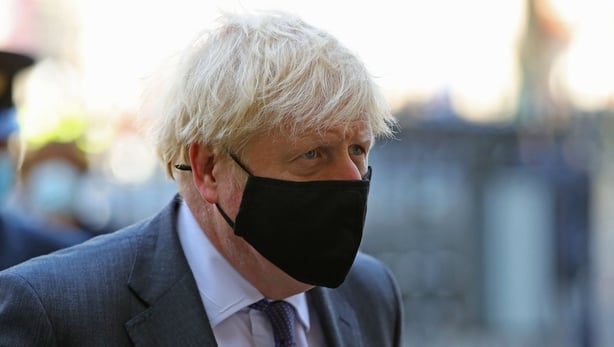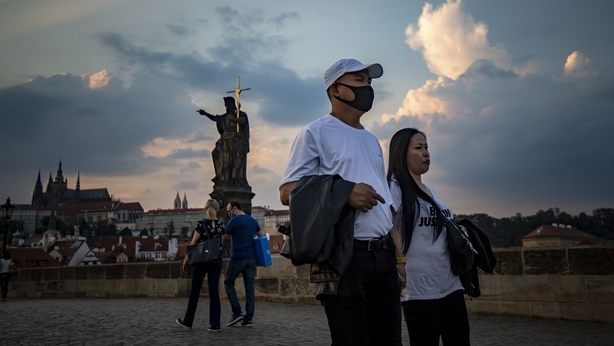The United States registered its 200,000th death from the Covid-19 pandemic today, the latest grim milestone for the country just weeks before voters decide if President Donald Trump will stay in office.
According to a rolling tally by Johns Hopkins University, 200,005 Americans have died and 6.86 million have been confirmed infected by the coronavirus.
The US has had the world's highest official death toll for months, ahead of Brazil and India, with 137,272 and 88,935 deaths respectively.
Overall, the US accounts for 4% of the world's population and 20% of the world's recorded coronavirus deaths.
In the US, Mr Trump has faced intense criticism of his handling of the crisis ahead of the November election.
"Due to Donald Trump's lies and incompetence in the past six months, (we) have seen one of the gravest losses of American life in history," his Democratic rival Joe Biden charged yesterday.
"With this crisis, a real crisis, a crisis that required serious presidential leadership, he just wasn't up to it. He froze. He failed to act. He panicked. And America has paid the worst price of any nation in the world."
Mr Trump insisted yesterday that the United States was "rounding the corner with or without a vaccine".

But US Federal Reserve boss Jerome Powell will warn today in testimony before a Congressional committee that a full recovery in the world's biggest economy "is likely to come only when people are confident that it is safe to reengage in a broad range of activities", according to prepared remarks.
Meanwhile, statistics from the World Health Organization show that the coronavirus pandemic appears to be accelerating worldwide, with new cases soaring last week to a new seven-day high of almost two million, even as new deaths decreased.
In a fresh global update, the WHO said that during the week ending 20 September, 1,998,897 new cases of the novel coronavirus were registered around the world.
That marks a six-percent increase over a week earlier and "the highest number of reported cases in a single week since the beginning of the epidemic," the UN health agency said.
Since the novel coronavirus first surfaced in China late last year, it has infected more than 31 million people around the globe and has killed nearly 962,000, according to an AFP tally from official sources today.
Nearly all regions of the world saw new cases rise last week, WHO said, with Europe and the Americas seeing new cases swell by 11% and 10% respectively.
Only Africa, which has remained relatively unscathed by the pandemic, dodged the upward trend, reporting a 12% drop in fresh cases from a week earlier.
Even as cases shot up across much of the world, the number of new deaths is going down, the WHO statistics showed.
Last week, some 37,700 new deaths linked to the virus were recorded worldwide, marking a decline of 10% compared to the previous week.
The decline was driven by the Americas, long the hardest-hit region, where new deaths were 22% lower than a week earlier, and by Africa where new deaths dropped 16%.
The Americas meanwhile still accounts for half of all reported cases and 55% of deaths in the world. The clear drop in new deaths in the region were driven mainly by decreases in Colombia, Mexico, Ecuador and Bolivia.
The United States, which is the world's worst-hit country, and Brazil, the second-worst hit, continued to report the highest number of deaths, each reporting over 5,000 new deaths in the past week.
Europe, some of which is experiencing a second wave of infections, meanwhile saw its new death count shoot up to over 4,000 for the seven-day period, a 27%-hike compared to a week earlier.
France, Russia, Spain and Britain reported the highest number of new cases in the past week, while Hungary and Denmark reported the highest relative increase in deaths.
Britain continues to count the highest number of cumulative deaths on the continent at nearly 42,000 since the beginning of the pandemic.
Meanwhile, the British government will announce fresh steps today to try and stop a coronavirus surge in England, while the United States was on the verge of 200,000 Covid-19 deaths.

The pandemic is showing no signs of slowing down - more than 31.2 million infections have been detected worldwide, with 964,000 deaths - and nations are scrambling to contain new outbreaks.
The ramped-up response in Britain follows warnings that the country could see up to 50,000 cases a day by mid-October, and a month later exceed 200 deaths every day.
France and Spain are battling similar surges.
Under new rules to come into force on Thursday, English pubs, bars and other hospitality venues will be required to close at 10 pm. Food and drink outlets will also be restricted to table service only.
Many nations in Europe were easing restrictions after largely overcoming initial outbreaks, but the resurgence of the virus has forced them to tighten curbs again.
In the Czech Republic, Prime Minister Andrej Babis admitted yesterday that the government had loosened restrictions too quickly.

"Even I got carried away by the coming summer and the general mood," he said. "That was a mistake I don't want to make again."
A vaccine is considered crucial to ending the pandemic - with multiple development efforts underway around the world - but there are concerns that the poorest nations may not be able to access it.
More than 60 wealthy nations - but not China and the United States - have joined a programmed backed by the World Health Organization to facilitate poor countries' access to vaccines, according to a list published yesterday.
Until one is available, the options for treatment available to the less privileged are limited.
In Mexico, where more than 73,000 people have died, many are choosing to stay at home when they fall ill instead of seeking treatment at creaking public hospitals.

